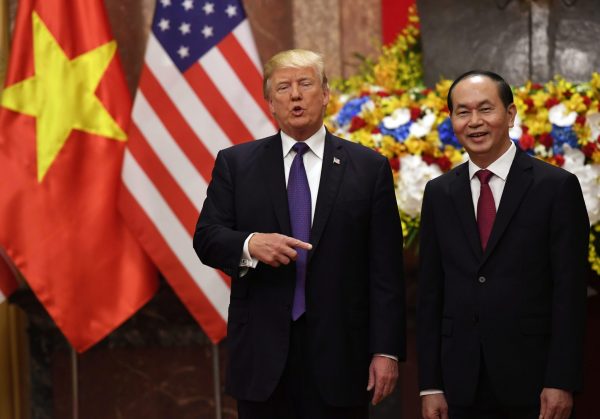Leaving aside the debate over whether the TPP was the ideal vehicle for regional economic integration, the agreement was expected to have a major impact on Vietnam’s economy. This was thanks to the ‘fundamental bargain’ embodied in the Obama-era deal whereby Vietnam stood to benefit from ‘large economic gains from preferential access to the American market (and a wave of direct investments in the country in anticipation of these expanded opportunities) in exchange for unprecedented levels of liberalisation’.
Now that the bargain is off the table, how is Vietnam faring?
Two articles in the Forum’s special features series suggest that strong growth and structural reform continue in Vietnam even in the TPP’s absence.
Suiwah Leung says that the fundamentals of Vietnam’s economy remain strong with GDP growing by 6.4 per cent last year. The government appears committed to keeping budget deficits and public debt levels under control and determined to make the most of the proceeds of continuing divestment from state-owned enterprises. But as she notes, the country’s ‘strong dependence on international trade and investment exposes its economy to geopolitical risks as well as growing protectionist sentiments globally’.
Policymakers in Hanoi understand this well. As Thomas Jandl notes in this week’s lead article, the fundamental economic and geopolitical drivers which made Vietnam an enthusiastic participant in the TPP process are still present, with energies now focused on securing a bilateral deal with the US.
As Jandl points out, ‘[t]he TPP was Vietnam’s natural hedge in its relationship with China, but that ship has long since sailed’. Its departure has not, however, deterred Vietnam from seeking to maintain close ties with the Trump White House, as Hanoi clings to the possibility of a future bilateral deal. The difference now is that Vietnam’s acceptance of a substandard bilateral deal will be even less about economic gain than about signalling support for continued US security engagement in the region.
Bilateral talks with Washington are very much a bargaining chip for Vietnam in the TPP-11 as well as for delivering its interests in the ASEAN-led Regional Comprehensive Partnership Agreement. These multilateral arrangements provide important leverage in dealing with both China and the United States. Even though the TPP was criticised for being as much an instrument of geopolitics as of free trade, other trade negotiations also provide strategic cover.
What has changed in the past year is that some of the novel political incentives that existed in the Obama era are now off the table. One manifestation of the TPP’s fundamental proposition — US market access in exchange for reform — involved a requirement that Vietnam bring its labour laws in line with International Labour Organization standards by allowing independent trade unions. It was mechanisms like this that gave substance to the broader claim made by observers like Dan Slater that Vietnam would respond to the rise of China in part by ‘burnishing democratic credentials as down payment on a stronger American alliance’.
These incentives for reform may have vanished under Trump, but Vietnam remains in need of political renewal. In recent months, the shortcomings of the current communist system have become clear in a corruption crackdown that many see as a pretext for a political purge. This involved the high-profile abduction of a suspect by Vietnamese security forces in Germany, straining relations with an important trading partner. As Carl Thayer observes, this sort of heavy-handedness ‘portrays Vietnam as a quasi-police state that does not respect the rule of law’.
Vietnam has long been credited with more accountability and pluralism within the one-party system than there is in China. Vietnam’s political leadership could take the opportunity to distinguish the country further from the Chinese model. A model that increases the role of the state in economic decision-making and pursues social control at the expense of ordinary citizens’ liberties is not the best recipe for a dynamic, socially diverse, and innovative future for Vietnam. A freer media and independent civil society that are able to call out governments on their excesses are the best ways to ensure that Vietnam’s world-leading growth can continue with less corruption, more environmental sustainability and better inclusion of social groups left behind by the post-Doi Moi economic reform boom.
In the Trump era, Vietnam may unfortunately be another casualty of a global deficit of leadership for the proposition that political pluralism and economic development are not mutually adversarial goals, but rather are ones that fundamentally complement one another.
The EAF Editorial Board is comprised of Peter Drysdale, Shiro Armstrong, Ben Ascione, Amy King, Liam Gammon, Jillian Mowbray-Tsutsumi and Ben Hillman, and is located in the Crawford School of Public Policy, College of Asia and the Pacific, The Australian National University.
This article is part of an EAF special feature series on 2017 in review and the year ahead.

